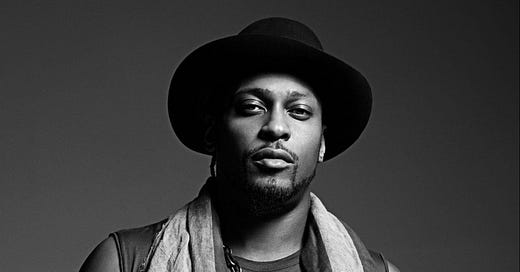There are moments in modern music so tuned to the frequency of truth that time itself seems to bend at their feet. July 10, 2015, was one of those moments—a humid Friday night in Rotterdam, Netherlands, when D’Angelo and The Vanguard didn’t just play the North Sea Jazz Festival—they consecrated it.
You want to know why we consider this man one of the architects of modern soul? Sit with that North Sea performance. Eyes closed, ears pried open, and spirit primed for communion. You’ll hear it. The ghosts of Watts and Memphis. The pulse of J Dilla’s MPC, the incense of Fela's shrine, the church of Sly and the Family Stone—the grit, the grind, the grace.
Let’s be clear: D’Angelo doesn’t entertain. He transforms. He doesn’t quote the past—he channels it through a filter of quantum rhythm. On that Friday night at the Ahoy, the setlist read like scripture from Black Messiah to Brown Sugar—but the gospel was in the groove.
Set the Scene.
House lights fade. The Nile Stage swells. “Ain’t That Easy” rolls in like thunder over the Delta, Pino Palladino anchoring the skies with those impossibly deep basslines—notes you don’t hear as much as feel rumble in the ribcage. Chris Dave (a drummer who plays like everyone before him left him notes) pulls the beat backwards, splits atoms of time, and rebuilds them with Afro-futurist precision.
“Spanish Joint” unfolds like a secret history of jazz-funk, with Isaiah Sharkey and Jesse Johnson throwing licks back and forth like cousins raised on Prince and Wes Montgomery. D’Angelo’s voice—raw honey scraped over sandpaper—slides through “Really Love” like a man testifying from the inside of a long, slow heartbreak.
And then comes “The Charade.”
Good Lord.
That’s where it all turns prophetic. Cloaked in anguish and resistance. “All we wanted was a chance to talk / ‘Stead we only got outlined in chalk.” It wasn’t just a song—it was a requiem for the criminalization of Blackness, a chant for Ferguson, for Baltimore, for everybody left nameless. He doesn't scream it. He doesn’t even raise his voice. He bleeds it.
The Vanguard.
Name a tighter band. I’ll wait.
Jermaine Holmes, Joi Gilliam, Red Middleton harmonize like the ancestors are guiding their lungs. Kenneth Whalum—sax in one hand, keys in the other—spins spirals of Coltrane-tinged dreamscapes. Keyon Harrold pierces the ether with trumpet lines that sound like they were borrowed from Miles Davis’s journal.
This wasn’t nostalgia. This wasn’t a Vegas soul revue. This was a time of resistance, reinvention, and revival. D’Angelo and The Vanguard moved the goalposts, sure—but more than that, they redrew the map of what soul can be when it’s handed over to the restless, the reverent, and the revolutionary.
We talk about musical change agents—James Brown, the father of funk. Chuck Brown is the godfather of go-go. D’Angelo is their spiritual heir, but also their disruptor. He takes the raw ingredients—syncopation, pocket, message, mood—and cooks it down into something so subversively modern it reshapes everything in its wake.
So, here's my Friday benediction:
If you want to know where soul music went after the fall of analog and the rise of the algorithm, look no further. That North Sea stage? That was church. That was rebellion. That was funk under fire, and D’Angelo walked through it with a guitar in his hand and salvation in his throat.
And the people?
We didn’t just listen.
We believed.






He truly is and the concert, off the map!
Glorious!